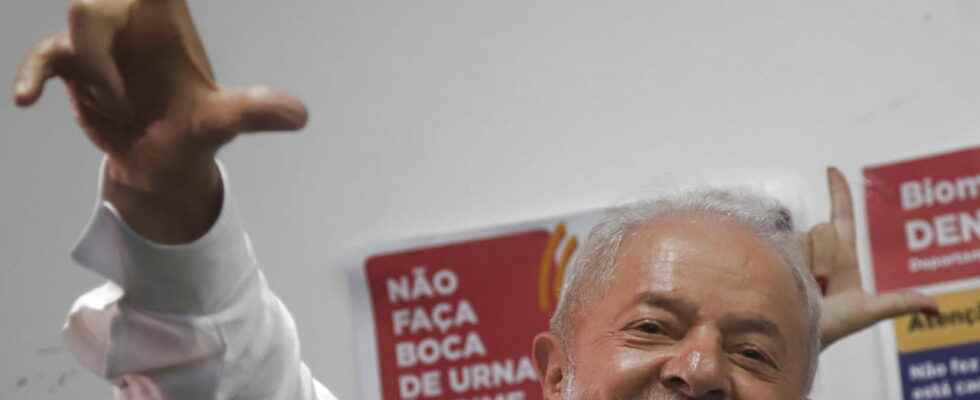Learn more
According to the first figures from the Brazilian Superior Electoral Court, 56.68% of the votes go to Bolsonaro and 43.32% to Lula. But only 1.16% of the ballots are counted, at 9:14 p.m. These numbers will change throughout the evening.
Until the last days of the presidential campaign the polls were moving forward on the result of the election in Brazil. The match promises to be very close this Sunday, October 30 because if according to the opinion polls Lula has the advantage, he only has a small lead. The latest poll from Datafohla published on October 29 granted 52% of the credited voting intentions against 48% for Bolsonaro. However, the polls lost credibility in the eyes of the outgoing president and his activists after he underestimated Bolsonaro’s score in the first round of the presidential election by 8 points.
All of Brazil held its breath as the results of the first round of the presidential election were announced and waited to hear if Lula’s victory was to be announced. But contrary to what the latest polls predicted before the election, the former head of state did not win the election at the first attempt on October 2 last. He came out on top but with a much smaller lead over his rival in the second round: Jair Bolsonaro. Lula won 48.4% of the vote against 43.2% for the outgoing president according to the official count of the Superior Electoral Court. The two men and heavyweights of Brazilian politics shared the overwhelming majority of the 118 million votes. In third position, center-right senator Simone Tebet obtained 4.2% of the vote when Ciro Gomes came in fourth with 3% of the vote. On the abstention side, just over 20% of Brazilians chose not to vote in the first round of the presidential election.
Initially, there were eleven on the starting line but there have only been two since October 2, 2022 and the first round of the presidential election: Lula and Bolsonaro. The former president of Brazil and the current head of state have been the two big favorites in the election from the start. However, almost everything opposes the two policies. On the left, Lula is the emblematic politician of the first decade of the 21st century with two presidential terms on the clock but also stains such as his convictions in 2017 and 2019 for corruption and his 500 days spent behind bars before being released and cleared on Supreme Court decision. Despite this bad patch, the Brazilians keep the memory of Lula of his mandates during which Brazil prospered, also thanks to a more favorable situation. Lula was able to gather around him widely, from the radical left to the center, even a small part of the democratic center right, in particular by the choice of his running mate, Geraldo Alckmin. The candidate now hopes to see the voters of the center right of Simone Tebet, unsuccessful candidate of the first round, rally to him.
On the right, Bolsonaro benefits from a solid electoral base made up of conservative voters, many evangelicals, members of the army and on the one hand the big bosses. Above all, the candidate has the state machine on his side, which offers him significant visibility. The outgoing president also benefits from misinformation which is to his advantage.
The presidential campaign has been driving Brazil for many months, but the 2022 presidential election began on Sunday, October 2, 2022 for the first round. The ballot saw the qualification of Lula and Bolsonaro who returned to the campaign the day after the results. The two men will defend their program for four weeks and until the last days before the second round scheduled for Sunday October 30, 2022. Note that the candidate who will be elected president on the evening of the second round will not take office until January 1 2023, by then Jair Bolsonaro will remain the head of state and will work on the transfer of power.
Once elected, the President of the Federative Republic of Brazil is in place for four years. But before settling at the head of the country it is necessary to win the majority vote in two rounds. A victory in the first round of the presidential election is possible if a candidate wins an absolute majority of the votes, ie 50% of the valid votes plus one vote. Otherwise, the two candidates in the lead are qualified for the second round and it is then the one who obtains the best score in the ballot box who is elected. Each candidate presents himself with a running mate who is a candidate for the vice-presidency. During the presidential election, Brazilians elect both the head of state and his right-hand man. He too is elected for a term of four.
On the suffrage side, the participation rate is generally high due to the compulsory vote imposed by the 1988 Constitution which obliges all citizens from 18 to 70 to participate in all the elections. An obligation from which Brazilians aged 16 to 18, those over 70, but also soldiers and illiterate people are exempt. This obligation does not prevent an increase in the abstention rate in recent years. In the 2018 presidential election, 21.3% of voters abstained.
